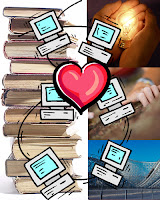The most popular blog entry of 2007 was the “Conduct Unbecoming?” entry from a few weeks ago. Most of the teachers who commented indicate that they use social networking sites like MySpace and Facebook to keep in touch with current and former students. As a result, many objected to limiting teachers’ communication and advocated that teachers should continue to use such spaces. Teri Lesesne (blog, school page) explains in her comment:
I do think telling teachers to forego blogs and social networks crosses over the line, though. Our presence within communities where our students are comfortable connects us in new and fresh ways. Our willingness to embrace new technologies is also essential.Another teacher who posted anonymously shared an analogy: “The world has changed. Saying educators should not be involved in online communities today is the same as saying 5 years ago we should not talk on our cell phone in public. Who knows what random students could overhear?”
Naturally, teachers agreed that online postings should maintain a level of professionalism. Teacher-commentator Matt Skillen (blog) states, “I believe it is important for teachers to have an identity online, however professionalism should be maintained. If one posts pictures online that could lead the viewer to believe the teacher was acting inappropriately, he or she should be prepared to answer the questions from students, parents and administrators.”
The topic is certainly controversial—and the issue is not limited to students. One of the commentors shared the Dayton Daily News story “Online profiles a factor in college admissions” and BoingBoing posted the contradictory findings that “Adults warn kids off social network sites, use them themselves—Pew Internet report on search and identity.” On the positive side, the New York Times reported this week “On Facebook, Scholars Link Up With Data.”
The only thing I think we can all agree on is that as new 21st century literacies develop and composing possibilities evolve, the controversies will continue. When people first started publishing novels, women authors often had to pen their stories under male pseudonyms to be published.
My hope for 2008 is that teachers aren’t driven underground in the same way by the school systems where they teach. Communicating is the life’s blood of the English teacher. Our lives are devoted to such vital tasks as helping others tell stories. It would be a sad world if we were forbidden to share our own stories with the world.














